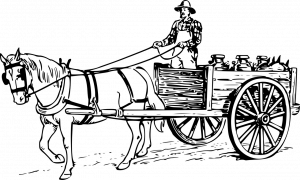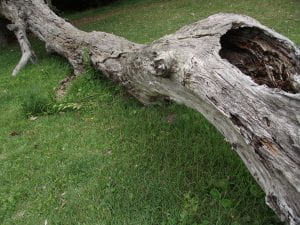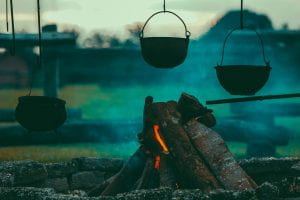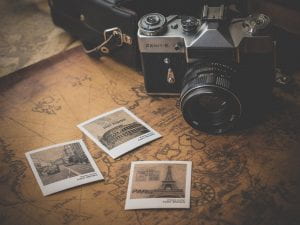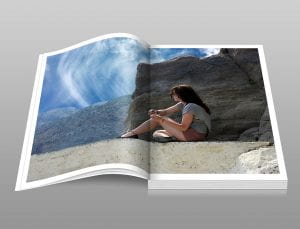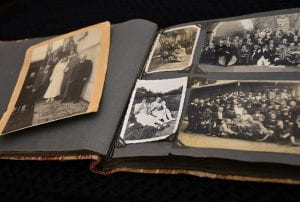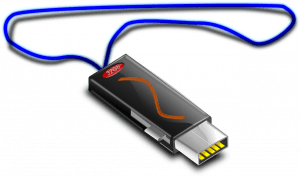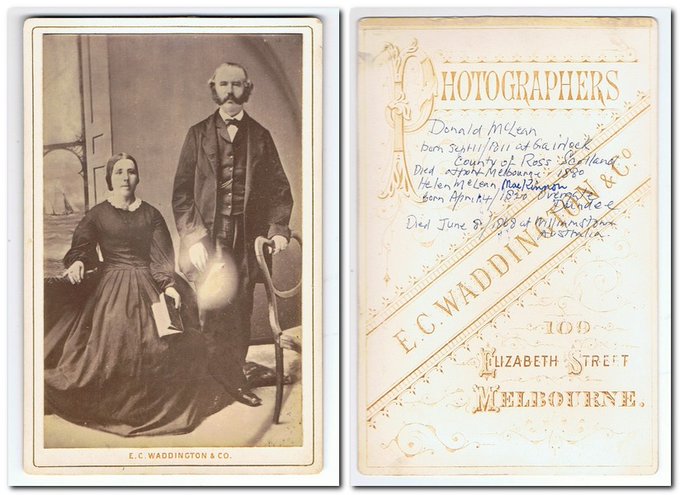This was a twitterchat where I knew lots of info for those starting to research a convict in their family.
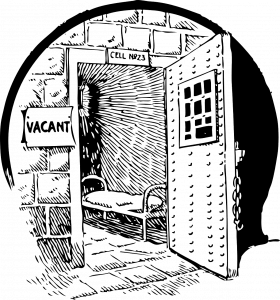
Do you have convict ancestors? Share their names, places of origin, when and where they arrived and what their crimes and sentences were.
Maternal: John England Yorkshire, Rebecca Jackson County Donegal, Francis Colgrave Bedfordshire, Isabella Watkins Yorkshire, John Holliday Boyd Cornwall/Devon, Martha Hearn/Virco London
Paternal: William Dawson and Catherine McKay – from Scotland mentioned in our Scottish chat, Matthew Sutton London and Mary McCrewney Newry Parish, Down Ireland, possibly Patrick Somers Wexford Co
James Kirk (1794-1877), Bucks. Convicted Feb 1832 – stole a sheep from Thomas Whitworth, Mursley, Bucks, value 45 shillings. Death, commuted to transportation (life). Arrived Sydney Cove, NSW, on ‘Camden’. Assigned as farm servant to James Arndell of Woodlands
I forgot – my g g g grandfather aged 14 years got death commuted to 14 years for stealing clothes. His brother earlier had received 7 years for stealing rope!
Somewhere between eight and ten: first was John Ryan, stole a hat in London, arrived 1788; last was Charles Millson, ‘Swing Rioter’ in Stanford Dingley, Berkshire, arrived 1831
The Swing Rioter Convicts and other Political Convicts like the Irish Rebels have very interesting stories
I’ve been reading a paper about the Swing Rioters & marriage in the colony. Interesting.
John Madden, sedition, County Galway 1820 arrived on the Dorothy, conditional pardon in mid 1830’s wife & 2 sons joined him in 1838, a daughter died on the way
Patrick Joyce, Yorkshire (but Irish), 7yrs stealing cheese,1835 Isaac Holmes, London, 7yrs for stealing pants, 1819 Robert Riches, Norfolk, stealing 6 geese 9 ducks, 1822 Joseph Collidge, Leicestershire, life 4 rape 1844 (convicts weren’t always petty crims)
now for my husband’s 10 Convicts Francis Byrne Mary Pardoe Thomas Crumpton Mary Johnson Terence O’Brian Mary Doyle Thomas Bates Francis Mills Henry Oliver Margaret Sheldon from Ireland and England
my husband has convicts in his family. His ggrandfather was sent to Tasmania. I’m not sure about his ggrandmother, but she may have too. He changed the surname, and they came to New Zealand. Another descendant is writing a book about them
Sometimes the most upstanding people in the community turned out to be convicts. My husband’s g g grandfather was the first mayor of Shoalharbour Council and no one knew he arrived as a convict
I’m afraid mine turned to drink as many did (said she sipping a wine). Samuel was famous for riding through the town roaring drunk looking for Margaret in the tavern. With no sewerage or running water in the home and 8 kids who can blame her?
there were a few name changes in the convicts of my family and my husband’s family
yes I have – they’re all in my various blogs plus the First Fleeters – Small Parker lines had a book issued in 1988 and there is lots of information available via Fellowship of First Fleeters website
Jonathan Harris (1800-1891) from East Sussex, England. Convicted in Sussex, 1825. Crime of burglary of a dwelling house. Received the death sentence, later commuted to transportation for life.
My 4X great grandparents George Lowe and Hanorah Ahern were both convicts. They were both convicted for stealing in Ireland but met in Hobart Tasmania
An aunt was transported in the ship George Hibbert in 1834 for 14 years for reset of theft. Husband received a same sentence. Originally from Ireland she was living in Glasgow. Had a child with her on the ship. (See post by Paula below)
13 convict ancestors for me and 10 for my husband – makes 23 for our daughter – I have to check the list of names to keep track of them all
John Small Mary Parker James Bradley Sarah Barnes Richard Hicks Margaret Howe Ann Daly Thomas Brain Thomas Callcott Samuel Weatherstone Charles Watson Waters Jean MacDonald Thomas Power – that’s my own 13 – the first 3 of whom were transported on First Fleet
Most of my 13 convicts were from Southern England, Ann Daly from Dublin Ireland Thomas Power from Waterford Ireland Jean MacDonald from Paisley Scotland
my parents did all our convict research years ago but when I did the UTAS course I had to do it again and am glad I did. More records/info available now and I’m more mature have more life experience and can imagine more what it was like.
No. My direct line brought themselves to either New Zealand or Australia. BUT I have a recently discovered convict that might be a missing family member. Family name, right age, but how to prove it.
Yes! I have at least two and possibly more. Samuel Taylor (convict) married Margaret Jones (convict) 3 April 1832. Samuel was from England and Margaret from Wales. Both were convicted for larceny for 7 years. Both died in Yass, NSW.

What do you enjoy about convict research? Which resources and records have you found helpful for convict research?
General records
A post Sue wrote when doing the convict courses at UTAS as part of the family history diploma. Includes links to pre transportation, surgeon reports as well as links found upon arrival in Australia
There are many places to find information on convicts including the British Newspaper Archive, Trove newspapers and the Digital Panopticon.
New South Wales and Australia in general
New South Wales Archives has a research guide and index to convict records they hold.
Lesley Uebel began the Claim a Convict website before her death in 2014. Does include Tasmanian convicts as well.
Peter Mayberry has links to many Irish convicts arriving in New South Wales.
Begun by Steve Thomas, this website called Convict Records includes 88% of convicts transported to Australia.
Parramatta female factory – Parragirls, searchable database of the female factory online
Jen Willetts website about Free Settler or Felon – lots of interesting information about the Hunter Valley, Newcastle and Central Coast
Tasmania or Van Diemens Land
My go to books, Susan Hood when transcribing records and Ian Brand for description of the convict stations in the 1840’s pic.twitter.com/F4ZFQRawAn
— Sue Wyatt (@tasteach) October 5, 2021
When the convicts were out working on roads etc they had to build their own little sort of town or village – barracks bakery commandant house etc Ians book list them all with descriptions
Fantastic resources for searching in Tasmania particularly the Tasmanian Names Index with their conduct, indent, description and muster records. Just put convict name in the search bar.
As well as the Tasmanian Names Index there is a convict portal with other links available both online and offline
One of the best things I learned at UTAS Family History Diploma. So glad we were taught how to read the conduct records. And the indents! Family information. Invaluable
Hamish Maxwell-Stewart spoke at the NSWFHA Conference last month and the kind of data analysis they are doing now with the convict records is fascinating. Really exciting stuff. Correlating things like solitary and punishment with life expectancy.
The Female Convict Research Centre has lots of info on their website about female convicts, the institutions, the ships, magistrates etc so check everything out on their website
If children arrived with convicts they were often put in the orphan school in Hobart so check records there.
Moreton Bay
Our own dear Jennifer Harrison published this book recently. mobshop.com.au/products/0af7b…
Scottish convicts
Anyone looking for #Scottish convicts may find this helpful: ‘Using Scottish High Court Records for Scottish Genealogy’ youtu.be/pbLj6ooJylw
I have one other, my 2xg uncle. My Scottish cousin has researched him very thoroughly. He was meant to be transported, but wasn’t. wikitree.com/wiki/McLean-69…
Hi @MargLBailey, we have come across this a few times now. @findmypast has some great prison records for England & Wales, they often show Scottish convicts who were sentenced to transportation but never left Britain.
Q2 Evidence and witness statements. I love to untie folded documents in the @NatRecordsScot and see what’s inside. #ANZAncestryTime https://t.co/RkMIpwFVmO pic.twitter.com/wxoG62HVzB
— Scottish Indexes (@scottishindexes) October 5, 2021
Irish convicts
Useful for Irish convicts: nationalarchives.ie/article/penal-… findingaids.nationalarchives.ie/index.php?cate…
Some of the convict records accessible from Ancestry
NSW, Convict Indent records, Gaol Description and Entrance Books, 1818-1930, Tickets of Leave – All State Archives NSW
Home Office: Convict Transportation Registers; Home Office: Convict Prison Hulks: Registers and Letter Books, 1802-1849; Home Office: Settlers and Convicts, New South Wales and Tasmania – All National Archives, Kew
Mr Cassmob’s Tasmanian convict moved to Melbourne after he’d served his sentence. We found the story of his crime in Irish Newspapers before they were online.
As I’m in Scotland I was able to see the original court documents from 1833 which are held in Edinburgh. Fascinating reading and the story was not what I’d expected. Some great info in Australian newspapers too.
I’ve actually lost count of the number of direct ancestors I have who were convicts. Most in VDL where the records are extremely rich and detailed or at least for most. Some were boring but the black sheep are absolutely fascinating
@scottishindexes did great research on my Scottish convict Jean MacDonald of Paisley – absolutely no way I could have unearthed all that information from down here in Australia
I enjoy constructing a life. Early days & family-BDMs, census, etc Crime-newspapers, court recs Transport-ship journals, indents Convict life-musters, colonial sec recs After-Aussie BDM, parish recs
I enjoy knowing the truth. I’m mainly using Ancestry.com, different Australian archives, as well as other websites (e.g. blogs). I’m fortunate to have been in touch with some distant cousins who had already done a lot of research on that line.
I haven’t researched my convict ancestors yet. The information I have was given to me by another family researcher, but I need to confirm it before accepting it as fact. This is on the ‘to do’ list.
Convict lives were so well recorded. Descriptions of them and so many records. That is what makes it interesting for me. And that one of mine left a diary
I have really enjoyed convict research since I studied it at UTAS. I was able to drill down much deeper into their lives with newspapers accounts of their crimes and lives. I would love to have found some prison or hulk records though.
I love reading the conduct records here in Tasmania but also if I can find the newspaper report back in UK, they can be very interesting too.

What challenges have you found when researching convict lives? (including after they became free) Is it different researching female and male convict lives?
My 2 x ggrandmother’s Scottish trial notes a child, her indent says 1 girl but thats it … I have seen mention, when freed and married to a freed Irish convict they wrote to the Colonial Sec NSW to bring “his” child from Scotland but no record of success.
Still trying to work out what happened to my ggf’s brother Christopher Rooney. Arrived Sydney 1833. In Parramatta gaol sentenced to iron gang for 12 months the following year then COMPLETELY DISAPPEARS FROM THE RECORD! Unfortunately I’ve found no mentions in newspapers runaway lists gaol records or bdms. No T/L or pardon (he was a lifer so no Cert freedom either) can’t find a Certain Freedom for his sister either although there’s plenty of other evidence for her later life
I can’t find any info on the child ancestor had with her on the ship. Don’t know what happened after she was freed and would like to know if she and husband convicted of same offence ever saw each other again.
The convicts were were well recorded but not their children always Often the shipping record just says ‘child with her’
I’ve found birth records for 3 children in Glasgow and don’t know what happened to any of them. Only one was on the ship.
Biggest convict challenge for me has been Charles Watson Waters husband of convict Jean MacDonald – my theory is he changed his name from Watson to Waters – also not so many records for convicts in later years
I thought my g g g grandfather was an Irish LAWYER. I was quite proud as he arrived in 1836. The years later I realised the record said SAWYER and it dawned on me…. he was a convict. The wrong side of the LAW
The first challenge was that none of us realised my great grandmother used her middle name as her first name. Once we were convinced of that we could verify the line back to the male convict. I don’t think I have any female convicts in my direct line.
I think the biggest challenge is first proving that the person you suspect is a convict is the right person (as in my Mary Kelly) and then the although they are well recorded as convicts they often disappear when freed
my female convict ancestor is less likely to be in a newspaper although she died after her husband so actually got to leave a will. It was very boring reading. I am disappointed that I am not able to pinpoint her place of origin more accurately.
Still trying to find if my Rebecca Jackson’s father and brother actually got transported to Australia as they stopped shipping for a few years from Ireland just after they were convicted in 1847
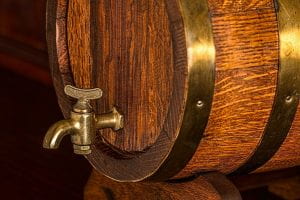
Share any interesting stories you have uncovered about your convict ancestors.
When James Kirk was transported, his wife, Elizabeth, and 5 children (aged between 1 1/2 and 12 years old) were left behind. Elizabeth and the youngest child died within 2 years of James leaving England, in effect rendering the remaining 4 children orphans.
Sad story. The young wife of my convict ancestor finally got to Australia to be with her husband then was killed in a horse and cart accident. Their baby was thrown but survived.
A4 my favourite pic from 2019 family history tripping in UK at Plow Inn London where Sarah Barnes was caught – that’s me with a sign saying thieves have been known to frequent the venue – the pub were chuffed to hear about Sarah #ANZAncestryTime pic.twitter.com/V4AoW9oKz6
— KerrieAnne Christian (@SteelyGenes) October 5, 2021
In 2019 my husband and I visited the Boxley Inn in Kent where his ancestor had been drinking before he was arrested and sent to Australia. They gave us a tour of the pub when we told them and a meal
If you stand on the corner of Gresham and Basinghall Streets, London, where my earliest ancestor was arrested, and look west, you can see where the second (his future wife) and fifth were arrested
contacted by a guy on Facebook- asking if I was descended from convict Samuel Weatherstone. I said yes – thinking – another cousin. No – he was descended from the person who Samuel robbed. He then adopted Samuel as his and now we call ourselves outlaw cousins
I found the story of my female ancestor’s crime quite disturbing. Pickpocketing sounds quite petty but in fact she was part of a gang and worked together with another woman to lure the gentleman towards other members of the gang. He was robbed extensively.
I have a female ancestors she was transported for “man robbing”. Also appeared to be working in tandem with another girl
I found about 40 ancestry trees referencing my convict ancestor & not one had any sources but finally I stumbled on Ray’s website which had an impeccably sourced story & finally I knew it was true – an Irish convict ancestor – yay!
Discovering my female convicts and my husband’s in the Parramatta Female Factory plus two freeborn daughters of 2 sets of my convicts were sent there – sparked more interest in the Female Factory for me
My convict ancestor became a wealthy business man and acquired many properties in and around Hobart
My g g g grand uncle Lawrence Frayne wrote a diary while on Norfolk Island. His work outlines what he thought of the harsh punishment there and he praised Maconochie. I have transcribed the diary and it is fascinating
My g g g grandfather who arrived aged 14 was doing well until he married the madam of a brother (who had arrived free). From then on each time SHE committed a crime he was sent to jail for her crime
I know my aunt escaped at one time as it was recorded in the newspapers but I’m not sure that would have been especially unusual
I had a convict ancestor who ended up on a hulk and never got transported other relatives were not as fortunate but I have not fully investigated
I’ve found the Convicts on Hulks records on Ancestry really helpful
Mortality on the hulks was shocking.
I recently was researching my ancestors’ involvement in the Red Barn Murder Trial in 1828 in England and discovered their son came to Tasmania as a convict. His daughter born in Tas. became a prostitute and ended up in gaol sad
Convict blog posts
KerrieAnne: Charles Watson Waters, Weatherstone siblings, Margaret Howe, Oliver/Shildon,
Brooke: Voyage of the Maitland in 1844, Patrick Joyce,
Pauleen: Gavin families, James Boland,
Sharn: Convict ancestors, Kitty Keeffe,
Alex: Convict posts,
Recommended by Carmel: Moreton Bay convicts,
Jennifer: Norah Ahern,
Sue: Rebecca Jackson and gang, William Tedman, My other convicts, Is she a convict?, Tasmanian convict records available,
Paula: Margaret Brawley,
Interesting discussion:
I love talking about & researching transported convicts, but I just can’t bring myself to use the term ‘Aussie Royalty’. If the origin is actually Jack Thompson on WDYTYA, he was referring to the step change, in family attitudes, from stain to royalty.
I don’t begrudge anyone else using the term if it gives them a giggle, of course, but I’m just not comfortable with it. I’m too matter-of-fact. Convicts were criminals, even if the punishment seems harsh to modern eyes. I wish I could articulate it better
I can see what you mean Brooke. There’s a tendency to think they were all badly done by, but not necessarily. Economic circumstances were often dire, but even so, you’d have to look at them case by case. I don’t have a single convict (from the convict era).
After 1770’s Revolutionary War in USA was over England demobbed lotsa soldiers onto streets. Females found themselves dislodged from jobs by returning soldiers. Other males like my 1st Fleeter John Small turned his Marines experience unsuccessfully as highwayman
Readers: Do you have a convict in your family? What records helped you tell their story?

